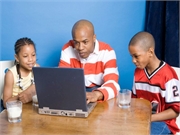- Could Your Grocery Store Meat Be Causing Recurring UTIs?
- Are You Making This Expensive Thermostat Error This Winter?
- Recognizing the Signs of Hypothyroidism
- 10 Strategies to Overcome Insomnia
- Could Artificial Sweeteners Be Aging the Brain Faster?
- Techniques for Soothing Your Nervous System
- Does the Water in Your House Smell Funny? Here’s Why
- Can a Daily Dose of Apple Cider Vinegar Actually Aid Weight Loss?
- 6 Health Beverages That Can Actually Spike Your Blood Sugar
- Treatment Options for Social Anxiety Disorder
Best Ways to Help Kids Through the Pandemic

They’re not at school. They miss their friends. And Mom and Dad look worried. Lockdown during the coronavirus pandemic can take a toll on everyone, especially kids.
Most children are aware of what’s going on at some level, said Dr. David Schonfeld, director of the National Center for School Crisis and Bereavement at Children’s Hospital Los Angeles.
Even toddlers pick up on their parents’ anxiousness and changes in the family’s schedule.
To help your children manage their feelings, you can ask what they understand and what concerns them.
“If a parent is worried about what’s happening, the children can pick up on that. I advise people not to hide it,” Schonfeld said in a hospital news release. “Children want adults to be authentic and genuine and honest.”
Adults who can talk with kids about how to cope with these events will be teaching them skills that will help them face future adversity, he said.
But parents should keep some worries to themselves, such as concerns about money, Schonfeld said.
“An offhand comment to a 12-year-old child, like ‘The stock market just destroyed your college fund,’ will only make the child worried. If that’s what a parent is worried about, he or she has some time to figure that out,” Schonfeld said.
Adults should keep a positive outlook. “This is a time to project to kids that there are positive actions being taken by scientists and others in charge,” he said.
Now is an opportunity for parents to spend time with their children doing creative projects or watching movies or TV.
“I recommend watching things that are uplifting or funny and that can be a healthy distraction,” Schonfeld said.
Schonfeld suggests several coping techniques to help kids deal with anxiety and stress:
- Talk to your children. Sharing can be helpful.
- Write about feelings or do art to express emotions.
- Mindfulness techniques can help you and your children focus and keep calm.
- Exercise at home or in your yard.
If your child is having emotional issues, let them express their feelings and don’t be judgmental, Schonfeld said.
Also, because this is a time of uncertainty, establish a schedule at home that can be seen as predictable. “You may not be able to tell kids when they’re going to be able to go to the playground or to a friend’s house, but you can tell them what time dinner will be,” Schonfeld said. This is reassuring.
The goal of being together isn’t to have a lot of fun and or to be the most productive in school or at work, he said.
“The goal is to figure out how to balance all the things people are being asked to do. As long as adults are helping kids stay secure and comfortable and confident, that will put them in the best position to make gains in the future,” Schonfeld said.
More information
For more on coping with stress during the pandemic, see the U.S. Centers for Disease Control and Prevention.
Source: HealthDay
Copyright © 2026 HealthDay. All rights reserved.










